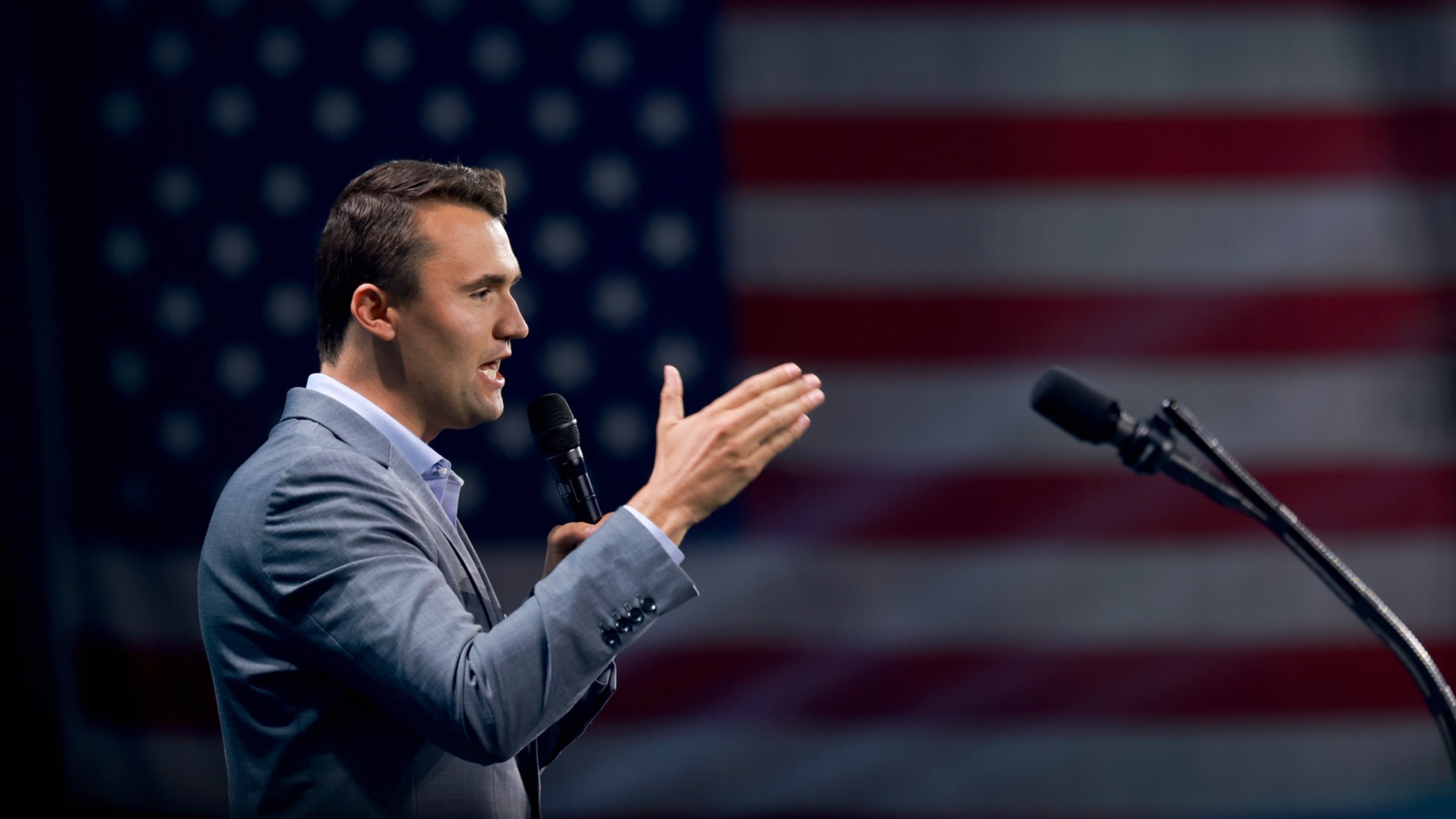Charlie Kirk: a shocking murder in a divided country
Little sign of kind politics in the US after political influencer killed

A free daily email with the biggest news stories of the day – and the best features from TheWeek.com
You are now subscribed
Your newsletter sign-up was successful
Charlie Kirk was sitting in the late summer sun, answering a question about mass shootings, when his audience at the Utah Valley University heard the crack of a bullet, and saw him slump sideways. Hours later, the 31-year-old political influencer and free speech champion was pronounced dead, the latest victim of a rising tide of political violence in America.
His death came at a febrile moment in US public life, said Peggy Noonan in The Wall Street Journal, but whereas previous assassinations have tended to lower the temperature, this one may have raised it. Many Americans are heartbroken, others are gleeful, “and they are irreconcilable”. But what a “disaster” this is for the young, in particular. Kirk had spent years counselling young Christians and conservatives, who felt “cowed or disdained” on America’s college campuses, not to be afraid to express their views – to defend their right to free speech. Now, thanks to the gruesome video clips of the shooting that quickly spread online, those young people have seen him being killed for doing just that.
New brand of cool
Kirk’s influence on American youth is hard to overstate, said Andrew O’Hehir on Salon. A decade ago, it became clear to him that the Left was winning the culture war; and that the figureheads of the Right were so old, and so “fatally unhip”, they had little chance of reversing that trend. Conservatives seemed to be “locked out of celebrity culture”, and of modern notions of coolness – so this charismatic product of the internet era concluded that they’d have to create their own celebrities and invent their own brand of cool. He wasn’t the first to have that idea, but few were as skilled as he was at promoting Trumpism to a young online generation.
The Week
Escape your echo chamber. Get the facts behind the news, plus analysis from multiple perspectives.

Sign up for The Week's Free Newsletters
From our morning news briefing to a weekly Good News Newsletter, get the best of The Week delivered directly to your inbox.
From our morning news briefing to a weekly Good News Newsletter, get the best of The Week delivered directly to your inbox.
Kirk knew that, online, rage sells – and though some are now “sanitising” his views, he didn’t hide his extremism, said Jonathan Freedland in The Guardian. He admitted that, owing to DEI initiatives, he’d be nervous if he got on a plane and the pilot were black; he warned of “prowling blacks” targeting white people; he said “Jewish dollars” were behind the spread of “cultural Marxism”.
And though he loved to argue his points, he didn’t seem that interested in the free exchange of ideas, said Nathan Taylor Pemberton in The New York Times. At his campus debates, he relished tearing apart the inexperienced students who took him on. Then he posted favourably edited clips on his social media channels, with titles such as “Charlie Kirk Crushes Woke Lies”.
An appalling response
No, his debates were “not Socratic exercises in truth-seeking”, agreed Gerard Baker in The Times. They were “clever propaganda” by a man determined to demolish the stultifying liberal consensus on US campuses. But at least Kirk had the courage to air his beliefs in public. He did not hide in online silos. He got people to hear opposing views, even if they did not listen to them, because he believed it was the best way to avoid civil conflict.
Now, he has died doing that, and the response of many has been appalling, said Camilla Tominey in The Daily Telegraph. On social media, posts suggesting that Kirk got what he deserved have received countless “likes”. Even the president-elect of the Oxford Union, who had met Kirk, celebrated his shooting (before apologising and deleting the posts). So convinced are many on the Left of the rightness of their views that they’re able to rejoice in the murder of someone who holds opposing ones. Yet they see no contradiction in calling for a “gentler, kinder politics”.
A free daily email with the biggest news stories of the day – and the best features from TheWeek.com
Calls for vengeance
There is little sign of kind politics in the US, said Jonathan Chait in The Atlantic. Senior Democrats expressed revulsion at Kirk’s murder, but President Trump did not call for unity. Instead, even before a suspect had been identified, he’d blamed it and other recent incidents of political violence on the “radical Left”, for likening “wonderful Americans like Charlie” to Nazis. No matter that his rhetoric is often just as inflammatory, or that there have been frequent attacks on Democrats – including the shooting of two lawmakers earlier this year, and the hammer attack on Nancy Pelosi’s husband (which Trump joked about). Chillingly, his administration has now vowed to “go after” the left-leaning NGOs that it claims “foment” political violence. Meanwhile, Maga supporters are calling for vengeance on people deemed to have welcomed Kirk’s death, said Ralph Leonard on UnHerd. Many have already been exposed and sacked from their jobs.
Yet the 22-year-old charged with Kirk’s murder may not have been motivated by left-wing ideology, said James Marriott in The Times. He seems to have hated Kirk; but the slogans scrawled on bullets he allegedly carried – memes, references to video games – suggest another factor, namely that strain of “ironic nihilism” that is ubiquitous in dark corners of the internet. The violence that incubates in these spaces has no clear drivers, other than a “loathing of the system, a love of chaos and a lust for attention”.